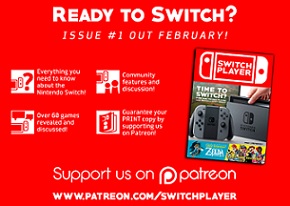Can crowdfunding help media businesses?

In my last blog on gaming consoles, I asked whether anyone would be brave enough to launch a new Nintendo magazine in light of the projected success of the Nintendo Switch console. Well, it turns out they have been…
Just days after I wrote that piece, SwitchPlayer magazine received a limited release after funds were raise for its launch through crowdsourcing platform Patreon.
Patreon is a website that provides a facility for content creators to build their own subscription services. The type of creators who use Patreon include YouTubers, writers, musician and podcasters. They are able to receive funds on a recurring, or per-item, basis from their ‘patrons’.
Just a few years ago, this would have been impossible. Who could’ve imagined a world where we’d be able to bring a magazine to market without a lengthy run-in, heavy investment in staff, design, and endless testing and focus groups?
Taking the traditional route, think of the hoops that would have to be jumped through to convince the money men there was enough demand to guarantee a return? Yet now, the infrastructure is in place to sidestep much of that, and Switch Player is the latest proof.
Thanks to crowdfunding sites such as Kickstarter, Gofundme and Indiegog this trend echoes through the media sector. A report by the Pew Research Center last year indicates that 20 magazines, 16 websites and numerous other journalistic efforts had been funded by Kickstarter. Interestingly, not all of these were independent projects or start-ups: ProPublica and the Boston Review both used crowdfunding to pay for certain projects.
Film, fashion, music, theatre, videogames and technology are other areas where projects that otherwise might not have seen the light of day have been given a start. Famously, the Pebble Time smartwatch achieved 4,067% of its goal and raised a total of $20,338,986, while ICONOMI’s fund management platform achieved 890% of its goal, raising $10,682,516, and the third instalment of Sega’s beloved Shenmue video game series achieved 316% of its goal, raising $6,333,295.
Significantly, it’s not just big projects that can prosper through crowdsourcing finance. Smaller projects can also find success. The We are Cornwall website, which aims to showcase Cornwall’s places, people and products, achieved its £15,000 target in just 42 days.
The point about crowdfunding is that it is not all about the money: it is also a useful test of whether an idea has broad appeal. Moreover, those people who helped fund the project are also very likely to keep using and supporting it once it has launched. They are quite literally invested in its future success.
While many of projects launched through crowdfunding might not have staying power – or even achieve their funding goals in the first place – those I’ve mentioned show that some do manage to breakthrough and can prosper.
Clearly, it won’t be plain sailing for all, but crowdfunding is an increasingly useful tool for independent media suppliers. And with that in mind, we should monitor, with interest, how SwitchPlayer fares. It might prove a useful sign to where crowdfunding could next take certain smaller scale – and niche – parts of the media business.